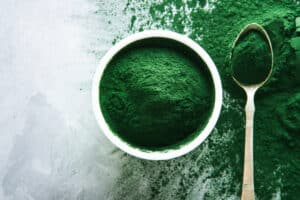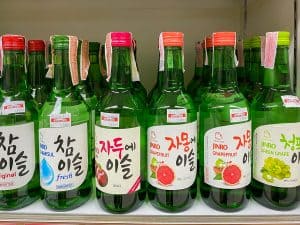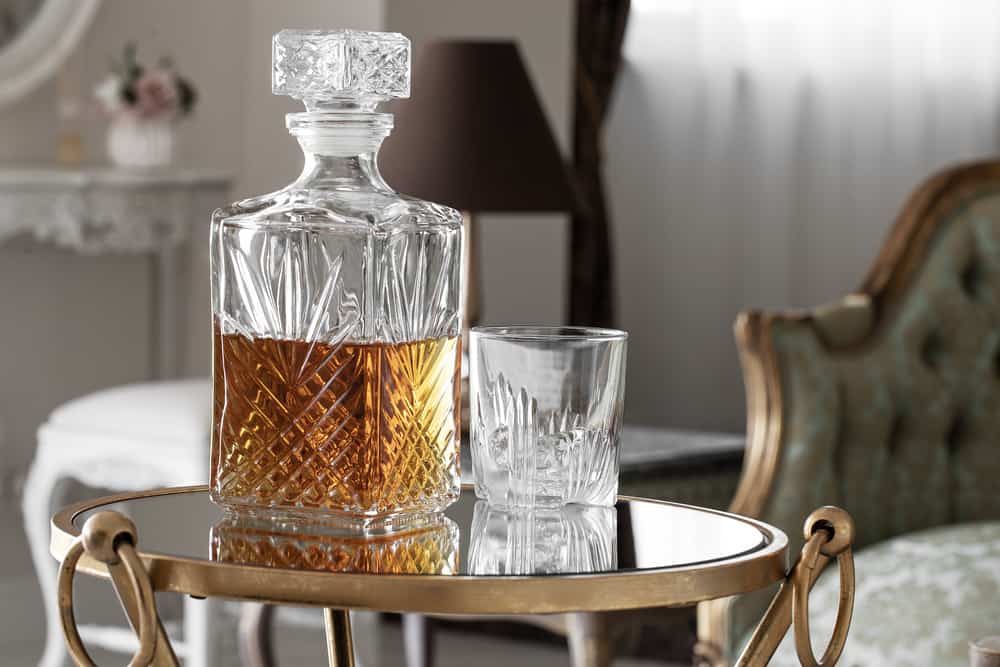
Since the dawn of humanity, humans have faced a particular problem—storing their drinking liquids safely. As time progressed, they figured out many ways to store their water and brews in containers ranging from shells, stone, and clay pots.
Time progressed, and the technologies improved, and so did the containers—ceramic, glass, and the Venetians figured out how to make glass and lead crystal containers.
While crystal decanters add a certain level of class and sophistication to your bar or drinks trolley, you might wonder how long whiskey can stay in a decanter?
You can keep whiskey in a decanter for around 1 to 2 years. It depends on a few factors, such as environmental conditions such as light, temperature, and humidity, whether the decanter has an airtight seal, and what material it is made from. It is advisable to avoid lead crystal decanters at all costs due to health concerns.
We’ll examine how long you can keep whiskey in a decanter, look into leaded crystal decanters and the perils thereof, and offer you advice on how to make your whiskey last when you decant it.
How Long Will Whiskey Last in a Decanter?
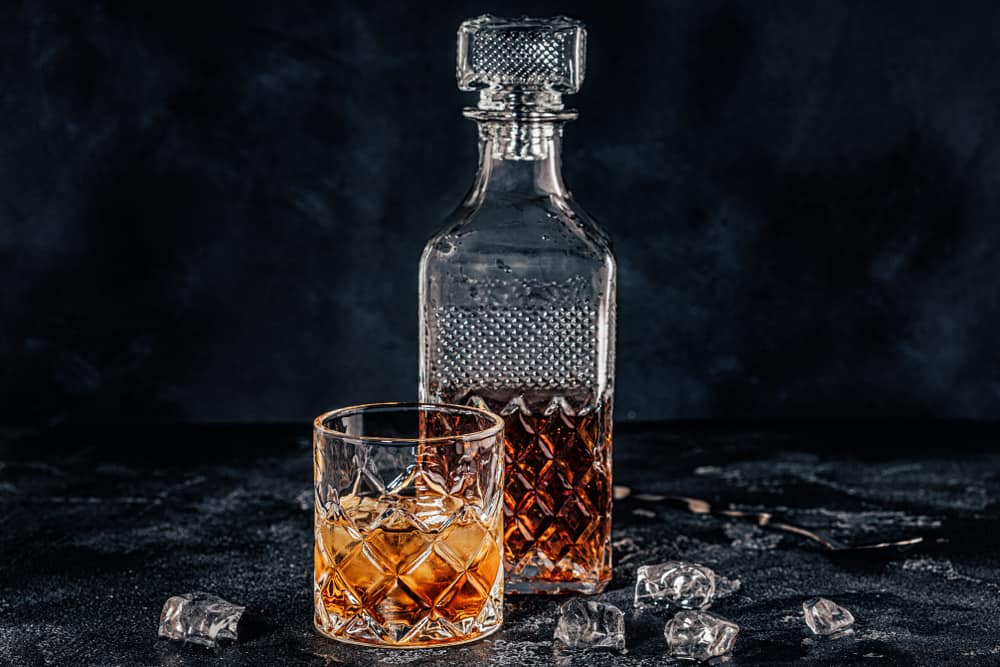
Unfortunately, the answer is not very long if it does not have an airtight seal. Suppose you decant whiskey and leave it in the decanter. In that case, it will lose its aromas and taste over time due to oxidation.
It’s worth noting that whiskey will never ‘go bad’ or become harmful to consume. The taste profile will shift because of fluctuating tannin and alcohol levels. A decanter with a proper air seal will keep your whiskey tasting good for around one to two years.
If you decant whiskey for aesthetic purposes or have company, decant enough to get you through the evening, plus two servings extra. Assuming you will not pour shots from your beautiful decanter, the standard pour for neat or on the rocks is 2 ounces (60ml).
You can practice free pouring by counting four seconds, but this is best practiced before you have company. A double is 3 ounces or 90 milliliters; for free pouring, count six seconds while you pour.
Does Decanting Whiskey Improve the Taste?
Experts are divided on this one. Whiskey is regarded as a “finished liquor”. It means bottled after aging in barrels; it cannot age more in the bottle on your shelf, unlike wine.
It will taste the same as the day it was bottled, in a month, or even 100 years later. The age also does not change when bottling whiskey—a 12-year-old will stay a 12-year-old even in fifty years.
Whiskey experts argue that when a bottle of whiskey is opened, the whiskey gets smoother to taste. So, while opening the bottle may improve the flavor of the whiskey, decanting does not always do so.
Are Decanters Safe?
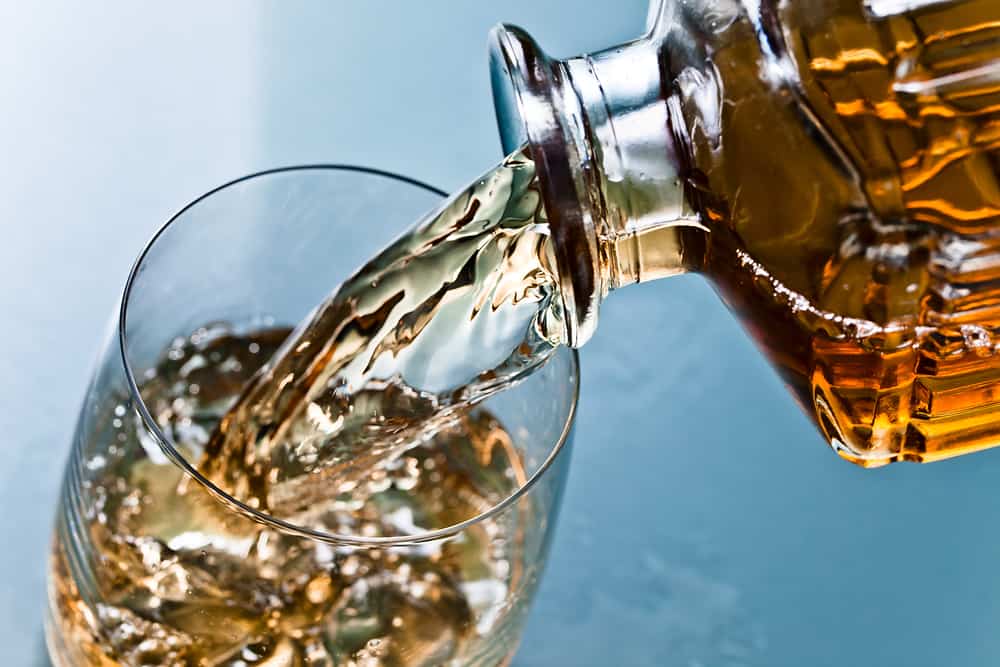
Decanter safety depends on the material used—not all decanters are created equally. Decanters that contain lead are considered unsafe because the lead can leach into the whiskey (or other liquids stored in it).
Lead oxide (PbO) in crystalware gives it brilliance, makes it reflect light, and gives unprecedented clarity. Manufacturers can also work with it at lower temperatures, giving them more control over the process and producing fewer bubbles.
But why is lead so unsafe? When lead is leached from the decanter into your drink, it will enter your bloodstream and accumulate in your teeth and bones. This accumulation, in turn, is released back into the bloodstream over time and can lead to lead poisoning.
Illnesses such as hyperthyroidism, paralysis, and kidney disease can worsen the effects of lead poisoning. Pregnant, lactating, and menopausal women also risk aggravating lead poisoning. You can learn more about lead and its harmful effects on the US EPA’s website.
According to the WHO, there are no safe levels of exposure to lead—in a single day, one sip of whiskey from a lead-based crystal decanter can equal three months’ worth of exposure.
Luckily, our skin does not absorb lead, so you are safe while handling lead-based decanters and glassware. Research has shown that after 6 to 8 weeks, whiskey stored in lead crystal decanters can absorb concentrations of 1,200 micrograms of lead per liter.
After a few days, some reached over 1,000 micrograms per liter.
We are not trying to scare you out of decanting your whiskey or trying to stop you from drinking whiskey.
By sharing this information with you, we feel that you can make smart choices and buy lead-free products to preserve your longevity because it is proven that whiskey offers many health benefits.
As beautiful and tempting as those antique decanters are, rather use them as decoration and avoid decanting your whiskey into them.
The Safe Choice—Lead-Free Decanters
Now that we got the bad stuff out of the way let’s focus again on how long whiskey can stay in a decanter and what alternatives are available to you. Glass decanters are your safest option for decanting whiskey.
However, it is still not advisable to store whiskey in a decanter unless it has an airtight seal. An airtight seal will preserve your whiskey in the decanter for around 2 years—given that you don’t open and close it regularly.
You can check out some great lead-free options here.
Decanter Tips
Here are some tips and tricks to upgrade your whiskey decanter game:
- Size: Size matters when it comes to decanters. Suppose you are hosting a party or whiskey evening. In that case, a larger decanter will work fine because you’ll pour enough whiskey to last the evening. The more your whiskey is exposed to air, the faster the dissipation process will be. Generally, a half-full decanter is a way to go. A smaller decanter would be the best option because you can fill it almost all the way and minimize exposure to air.
- Light: Exposure to light, especially sunlight, is deadly to any alcohol, even more so for whiskey because it has a fine balance of tastes and aromas. Exposure to direct sunlight will also cause your whiskey to evaporate quickly, taking the aromas with it and leaving you with a whiskey that can taste flat or unpleasant.
- Temperature: Tying in with the above, temperature control is also important. Fluctuations in temperature and humidity will negatively affect the integrity of your whiskey.
- Gas: An inert gas spray prevents oxygen from ruining your whiskey in the decanter through oxidation. Make sure the decanter’s top fits properly when you’ve added the gas.
Conclusion
Whiskey will last around a year or two in a decanter with a proper airtight seal. Still, it also depends on environmental and storage factors. It is best not to decant whiskey into lead crystal decanters because it can leach lead into your whiskey and cause lead poisoning in the long run.
There are alternatives on the market made from borosilicate glass that look just as great as their lead crystal counterparts without the health risk.

